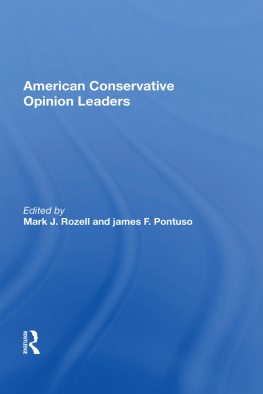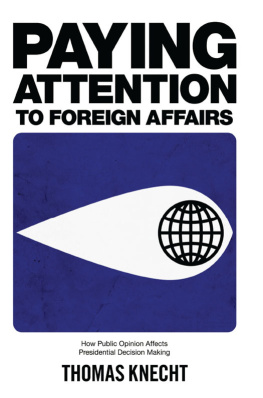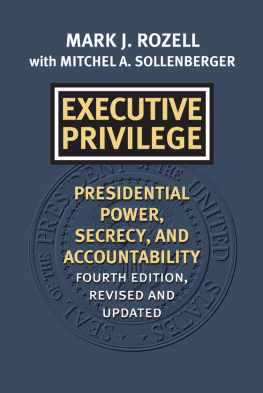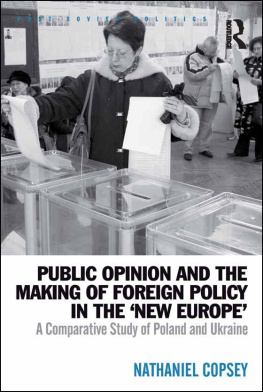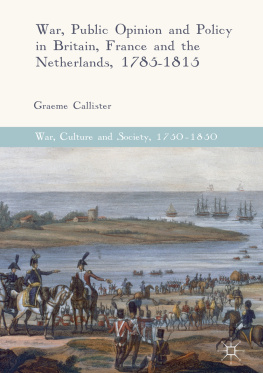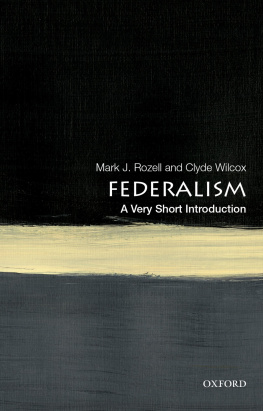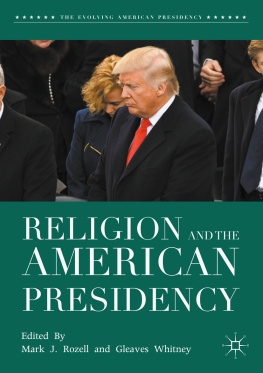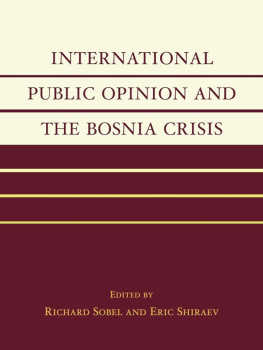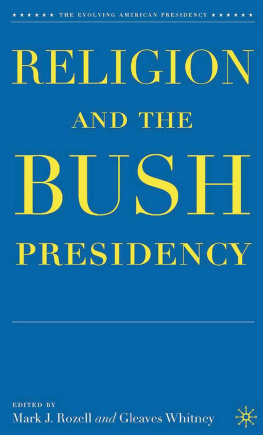American Conservative Opinion Leaders
First published 1990 by Westview Press
Published 2018 by Routledge
52 Vanderbilt Avenue, New York, NY 10017
2 Park Square, Milton Park, Abingdon, Oxon OX14 4RN
Routledge is an imprint of the Taylor & Francis Group, an informa business
Copyright 1990 by Taylor & Francis
All rights reserved. No part of this book may be reprinted or reproduced or utilised in any form or by any electronic, mechanical, or other means, now known or hereafter invented, including photocopying and recording, or in any information storage or retrieval system, without permission in writing from the publishers.
Notice:
Product or corporate names may be trademarks or registered trademarks, and are used only for identification and explanation without intent to infringe.
Library of Congress Cataloging-in-Publication Data
American conservative opinion leaders/edited by Mark J. Rozell and
James F. Pontuso.
p. cm.
ISBN 0-8133-0942-5
1. ConservatismUnited StatesHistory20th century. 2. United
StatesPolitics and government1989- . 3. JournalistsUnited
StatesAttitudesHistory20th century. 4. Political scientists
United StatesAttitudesHistory20th century. 5. Public
opinionUnited StatesHistory20th century. I. Rozell, Mark J.
II. Pontuso, James F.
E881.A44 1990
320.52-dc20
89-22609
CIP
ISBN 13: 978-0-367-00364-7 (hbk)
Contents
, James F. Pontuso
PART ONE
CONSERVATISM AND TRADITION
, Mark J. Rozell
, James F. Pontuso
, John Wesley Young
, David E. Marion
, Roger M. Barrus
PART TWO
THE NEOCONSERVATIVE MOVEMENT
, Jeffrey J. Poelvoorde
, Mark J. Rozell
, Mark J. Rozell
PART THREE
CAPITALISM AND ECONOMICS
, A. Craig Waggaman
, Sidney A. Pearson, Jr.
PART FOUR
FOREIGN AFFAIRS
, Robert A. Strong
, John Eastby
PART FIVE
CONSTITUTIONAL INTERPRETATION
, Edward S. Twardy
, Gary L. McDowell
Guide
This book grew out of our discussions in 1988 about what would happen to American conservatism at the end of the Reagan era. We concluded that a study of the political ideas of Americas leading conservative opinion leaders was in order. Only through such an examination could we understand the state of American conservative thought and the prospects for a political movement that was so influential during the Reagan years.
A second purpose of examining these opinion leaders is to display the rich diversity of thought present in modern American conservatism. For critics of the political Right who believe that the conservative coalition is monolithic and devoid of serious internal criticism, the chapters that follow should be eye-opening. The philosophical differences among conservatives are profound. Indeed, many conservatives devote more of their intellectual energies debating one another than they do criticizing the political Left.
Such internal debate is both a strength and a weakness. Political ideas must withstand scrutiny. Political thinkers often heed most seriously those criticisms leveled by their philosophical allies. Nonetheless, this kind of criticism from within can leave a political movement that is based on ideas splintered, leaderless and close to disarray. That appears to be the condition of the American conservative movement in the post-Reagan era.
Because the individuals studied in this book are well known and controversial, much of what is written about them is highly polemical and motivated by ideological considerations. Many of these analyses are found in such journals as The Nation, National Review, The New Republic, Commentary, Partisan Review, American Spectator and the New York Review of Books. Although the role that these and other leading journals play in the intellectual debate is important, our goal is significantly different: We seek to present original and balanced chapters.
A number of people helped this work come to fruition. We would like to take the unaccustomed step of thanking the contributors, whose diligence and insights made the book better than any we could have written on our own.
Sally Furgeson, our acquisitions editor at Westview Press, took a great deal of interest in this project from its inception and provided helpful insights throughout the important stages of manuscript development. Westview editors Jane Raese and Amy Eisenberg provided much-needed guidance through the books completion. Jan Kristiansson did a most thorough job of copyediting the manuscript. Westview Presss two anonymous reviewers offered outstanding recommendations for revisions. Many of their suggestions were heeded by the contributors.
The following individuals read and offered helpful comments and criticisms: Kenneth W. Thompson, James Sterling Young (University of Virginia); John M. Kramer, Michele M. McClain (Mary Washington College); and Lynda M. Rozell (Hunton & Williams). Donna Packard provided much-needed and efficient typing assistance. Judy W. Singleton, Sherril OBrien and Elizabeth Hoag thoroughly proofread the manuscript. Edythe Porpa produced the index.
The Mary Washington College Faculty Development Grant Committee, Hampden-Sydney College, the University of Virginia Raven Society Research Fellowship program and the White Burkett Miller Center of Public Affairs provided financial support for this book.
We would like to thank our wives. Lynda M. Rozell critically reviewed her husbands chapters and tolerated his constant queries on grammar. Anne M. Pontuso, R.N., C.C.R.N., shared her husband with his constant companiona computer.
Mark J. Rozell
Vienna, Virginia
James F. Pontuso
Charlottesville, Virginia
Introduction: Conservatism After Reagan
James F. Pontuso
As Ronald Reagan boarded the plane for his return to California on January 20, 1989, he left behind a triumphant political movement. Although some were pleased to see him depart, his conservative allies could take pride in the Reagan years. Under his presidency the nation had enjoyed a span of economic prosperity unprecedented in the post-World War II era. He had limited the expansion of the welfare state and reversed the trend toward a bigger and more intrusive national government. No new countries had fallen to Marxism-Leninism, and some had abandoned the doctrine altogether as Reagan had predicted they would in his 1981 speech before the British Parliament. Even the Soviet Union seemed to falter in its adherence to communism. During Reagans tenure, a new leadership emerged in the Soviet Union that was far more willing to compromise with the West. Not only did the Soviets agree to pull their medium-range nuclear weapons out of Europe; they pledged to withdraw from Afghanistan and Angola. From the perspective of many conservatives, Reagans military buildup and tough rhetoric had worked well. In order to keep up with American military spending, the Soviets were forced to choose a dynamic leader, Mikhail Gorbachev, who could reform their badly functioning economy. But even Gorbachevs charm could not transform the backwardness of the Soviet economic system without allowing greater political and social freedoms. Thus, a number of conservatives credited Reagans policies with having brought about Gorbachevs reforms.
Reagan also had restored faith in the American system of government. His simple message proclaimed that the days of confusion, distrust and malaise were gone; America was back. People responded to Reagan, for even when he bumbled, he was too affable to dislike. Confidence in government grew steadily during the 1980s, despite the setback of the Iran-contra controversy. The public perceived that Reagans leadership produced successful government.

